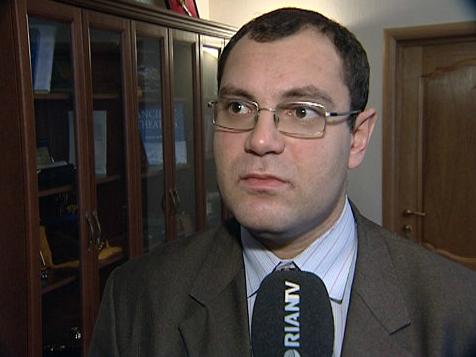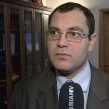
European Missile Defense, Strategic Strike Conventional Systems and Non-Strategic Nuclear Weapons: The View From 32/34 Smolenskaya-Sennaya Square
Publication: Eurasia Daily Monitor Volume: 8 Issue: 129
By:

The initial response to the outcome of the discussions on European missile defense at the NATO-Russia Council (NRC) on June 9 was quite negative (EDM, June 21, 22). Senior Russian officials at the talks described the results in that manner. Defense Minister Anatoliy Serdyukov stated that “fundamental differences” in the NATO and Russian positions had precluded an agreement, which brought renewed tough talk about an arms race with the Alliance and practical measures to counter a NATO missile defense system through the deployment of Iskander missiles to Kaliningrad Oblast and possibly Belarus (Izvestiya, June 10).
More recently, Alexei Fenenko, Leading Research Fellow at the Institute of Problems of International Security (Russian Academy of Sciences) pointed to the failure as evidence of a setback for the “reset” and proof of another cycle in US-Russian relations moving away from cooperation toward conflict. Fenenko stated that something had gone deeply wrong with that policy and cited a number of points of tension in the relations in which European missile defense played a role but was only part. Fenenko mentioned: “The US refusal to compromise over its ABM system, ongoing tensions over Iran, Libya and Georgia, Washington’s support for Japan in its territorial disputes with Russia, the US media’s infatuation with the “Khodorkovsky case” and described them as “symptoms of a deeper problem” (RIA Novosti, June 21).
That deeper problem to Fenenko was the persistent cycles of “convergence and divergence, which have marked US-Russian relations since the end of the Cold War. “Reset,” as put into practice by the Obama administration, had been meant to transcend the old framework of ties shaped by strategic parity and arms control and provide a new foundation for relations beyond the calculus of mutual nuclear deterrence and sustaining military strategic parity. Fenenko concluded that the driving force in these negotiations was the desire for strategic stability while military modernization was going forward, which is how he categorized the present period (RIA Novosti, June 21). This entire analysis makes US-Russian relations the primary axis in the international system, when objective circumstances make it clear that both the United States and Russia are engaged in a reorientation of their international positions in light of domestic and international developments well beyond their bilateral framework.
In this context President Medvedev’s remarks at the G8 Summit in Deauville in late May 2011, take on a very different perspective. At that time, Medvedev expressed his disappointment with US and NATO responses to proposals for a joint concept of European missile defense, which would guarantee Russia that the proposed system was not intended to undermine the deterrence stability of Russia’s strategic nuclear weapons. Medvedev had then called for progress on the current round of talks or face a new arms race in 2020.
I am still very displeased with the reaction to my proposals from the American side and generally from all NATO countries. Why? Because we are wasting time, although I spoke last evening of 2020 as a deadline, but what is so special about 2020? That is the year when the four-stage system now-under construction, the so-called four-stage, Phased, Adaptive Approach will be completed. After 2020, if we do not have an agreement, a real arms race will begin (President Medvedev’s press conference, Deauville, France, 27 May).
Medvedev expressed displeasure with the US-NATO response to his proposals but did not set an immediate deadline for negotiations, only warning that they would become tougher as time passed and the US-sponsored Phased, Adaptive Approach reached completion. What was emphasized was not a joint system but a joint “concept” with a guarantee that the mature system would not represent a threat to Russia’s strategic nuclear deterrent forces.
During the June 9 press conference at the Russia-EU Summit in Nizhny Novgorod, the Russian foreign ministry press spokesman, Alexander Lukashevich, answered two questions relating to European missile defense. The first concerned remarks by Senator Patrick Leahy, the Chairman of the US Senate’s Subcommittee on Appropriations, which claimed that Russia had no right to withdraw from the START III Treaty in response to US deployment of an ABM system. Lukashevich stated that this position was the product of an attempt to “creatively rethink” the content of the treaty. He further stated: “We presume that universally recognized norms of international law are applicable to this treaty,” and concluded that the appearance of any new threat to Russian strategic nuclear forces would be sufficient cause to abrogate the treaty. “This is also reflected in the Federal Law on Ratification of the Treaty.” Lukashevich noted that the United States had withdrawn from the 1972 ABM Treaty when it suited US interests. The second issue concerned the meeting of the NRC in Brussels and the lack of progress there on the issue of European missile defense. Lukashevich refused to categorize the situation after the talks as a “dead-end” and said that Russia’s basic position had not changed:
“Russia is ready to continue the dialogue on missile defense, but insists on clear-cut legal safeguards that there would be no diminution of our strategic capabilities. It is necessary to jointly work out the concept of creating a European missile defense system that takes into account not only the interests of Russia and the NATO member countries, but also of other states that could potentially participate in this system” (Ministry of Foreign Affairs of the Russian Federation, Information and Press Department, “Briefing by Russian MFA Spokesman Alexander Lukashevich, June 9).
Moscow was calling for a joint “concept” and not a joint system. It wanted transparency in its development and legally binding statements that the system was not intended to undermine Russian capabilities (Ministry of Foreign Affairs of the Russian Federation, Information and Press Department, “Briefing by Russian MFA Spokesman Alexander Lukashevich, June 9). Lukashevich was evidently much closer to President Medvedev’s position of May 27 than the reactions of the negotiators in Brussels.




